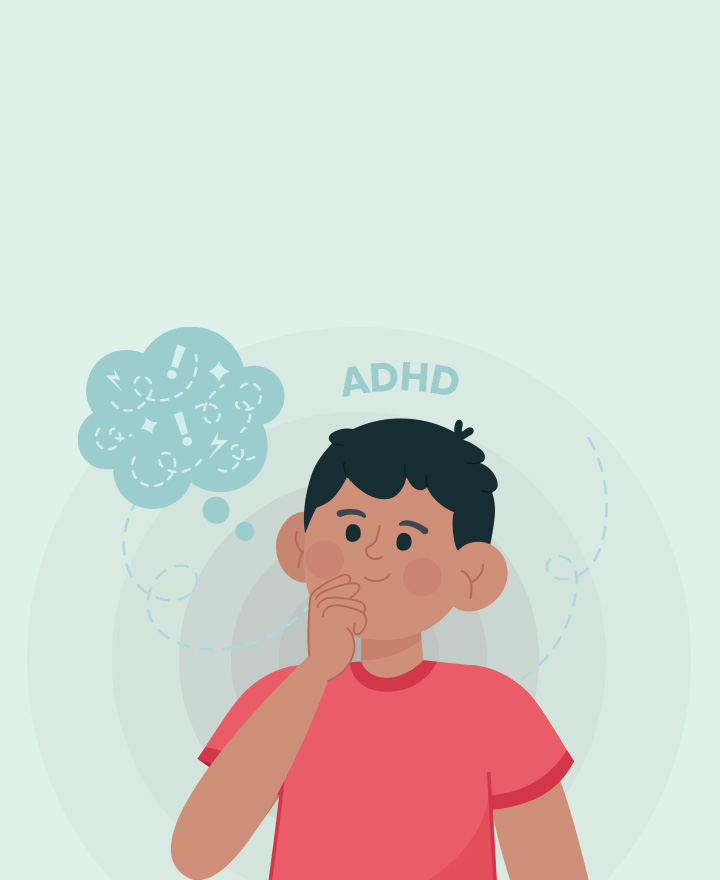

Attention Deficit Hyperactivity Disorder (ADHD): Types & Symptoms
Attention deficit hyperactivity disorder (ADHD) is a neurodevelopmental disorder which primarily affects children of young age. Although adults can be affected too, ADHD is more commonly seen among children of 6-8 years. As the symptoms are initially mild, it is difficult to diagnose this disorder.
What is ADHD?
Earlier known as Attention deficit disorder (ADD), ADHD is a brain disorder marked by an ongoing pattern of inattention and/or hyperactivity-impulsivity that interferes with functioning or development. It is commonly diagnosed in school-age children and is more common in boys than in girls.
Types of ADHD and their Symptoms
Attention deficit hyperactivity disorder (ADHD) is classified into 3 types based on the symptoms.
1. Hyperactive-impulsive type ADHD -
This type is predominantly found in young boys. The most common ADHD symptoms of this type are-
a. Squirming
b. Constant talking
c. Difficulty in sitting still
d. Talking out of turn
e. Inappropriate and blurt out answers
f. Endless physical motion
g. Trouble sitting or playing quietly, etc.
2. Inattentive type ADHD -
Adults and girls are most commonly affected and following are key symptoms of this type:
a. No or very less attention
b. Difficulty in focusing or concentrating
c. Forgetfulness
d. Always in denial mode for tasks that need efforts
e. Unable to understand and follow instructions
f. Not listening
g. Commit careless mistakes repeatedly
h. Losing the things that are required to finish some task
i. Quickly bored of any activity or task soon
j. Getting distracted very easily.
3. Attention deficit hyperactivity disorder (ADHD) combined presentation type-
The symptoms of this type are a mix of inattentive and hyperactive-impulsive ADHD.
ADHD Causes
The exact cause is unknown, but researchers suggest several things that may lead to it, including:
● Genetics, wherein ADHD runs in families.
● Poor nutrition, infection, drinking, smoking, and substance abuse during pregnancy can affect a baby’s brain development which may cause Attention deficit hyperactivity disorder.
● Premature birth, especially before 37 weeks
● Damage to the front of the brain can cause problems controlling impulses & emotions
● Toxins such as lead may affect a child’s brain development
In fact, the exact cause of ADHD cannot be accurately determined and can only be estimated based on some tests and charts. However, the bigger concern is the proper diagnosis of the right condition so that treatment following the same is accurate enough.
ADHD Diagnosis & Testing
Doctors use the American Psychiatric Association’s guidelines, which are based on how many symptoms a person has and how long they’ve had them. To confirm a diagnosis of ADHD or learning differences, a child may take a battery of tests to check their neurological and psychological status. The test may include
• A medical & social history of both the child and the family
• A physical exam and neurological assessment that includes screening of vision, hearing, and verbal and motor skills
• An evaluation of intelligence, aptitude, personality traits, or processing skills.
• A scan called the Neuropsychiatric EEG-Based Assessment Aid (NEBA) System, which measures theta and beta brain waves.
ADHD Treatment
There are several approaches to treating ADHD and typically a combination therapy is considered the most effective treatment.
1. Medications-
Stimulants are the most preferred and prescribed medications for ADHD as they are found to balance the chemicals in the brain called neurotransmitters. They are given alone or in combination with other medicines like antidepressants.
2. Therapy -
These treatments focus on changing behaviour and it includes cognitive brain therapy (CBT), psychotherapy, behaviour modification and family therapy.
3. Lifestyle changes-
A healthy and nutritious diet, a good sleep routine and positive attitude, etc., are found effective along with the other therapies. They can control and minimize ADHD symptoms.
Conclusion
Attention deficit hyperactivity disorder (ADHD) is a chronic behaviour disorder usually diagnosed in early childhood. The impact of ADHD varies for each individual but with correct diagnosis, medications and lifestyle management it can help in controlling the condition and allow them to lead a normal life.
Disclaimer: This blog provides general information and discussions about health and related subjects. The information and other content provided in this blog, website or in any linked materials are not intended and should not be considered, or used as a substitute for, medical advice, diagnosis or treatment. Kindly contact your Doctor before starting a new medicine or health regime.
Related Articles
The Effects of Depression on the Body and Overall Wellbeing
How to Boost Your Immunity - Best foods & Home Remedies
Importance of Healthy Eating as You Age
Published on September 06, 2022

















 Car Insurance
Car Insurance  Bike/Two Wheeler Insurance
Bike/Two Wheeler Insurance  Health Insurance
Health Insurance  Pet Insurance
Pet Insurance  Travel Insurance
Travel Insurance  Home Insurance
Home Insurance  Cyber Insurance
Cyber Insurance  Third Party Vehicle Ins.
Third Party Vehicle Ins.  Tractor Insurance
Tractor Insurance  Goods Carrying Vehicle Ins.
Goods Carrying Vehicle Ins.  Passenger Carrying Vehicle Ins.
Passenger Carrying Vehicle Ins.  Compulsory Personal Accident Insurance
Compulsory Personal Accident Insurance  Travel Insurance
Travel Insurance  Rural
Rural  Critical illness Insurance
Critical illness Insurance